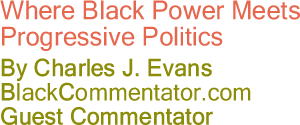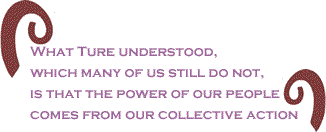
|
||||||||||||||||||||||
 |
||||||||||||||||||||||
 |
||||||||||||||||||||||
 |
||||||||||||||||||||||
 |
||||||||||||||||||||||
 |
||||||||||||||||||||||
 |
| The current issue is always free to everyone |
|
|
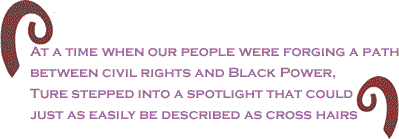 |
During an author lead
discussion of the book, Waiting
'Til the Midnight Hour: A Narrative History of Black Power
in America, by Peniel E. Joseph, the comment was
made that the progress of Barack Obama in this year’s democratic
primary is evidence of Black Power, even if Mr. Obama does
not realize it as such. Obama is a deft politician, a clearly
capable leader, and perhaps the great political change agent
he fashions himself. This said, there are some very clear
strides that he has made to diverge from some of the key
values of Black Power that may not be the actions of a “sell-out”,
but fall short of the ambitions of a true Pan Africanist.
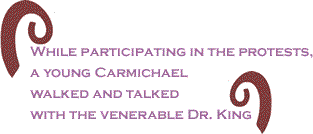 To
even begin to consider Black Power and its political implications
to Obama’s campaign, we must consider its origins. Without
going into the great detail it certainly demands, “Black Power”
is the phrase coined by Kwame Ture (then known as Stokely
Carmichael) during protests of the violent backlash against
integration of the To
even begin to consider Black Power and its political implications
to Obama’s campaign, we must consider its origins. Without
going into the great detail it certainly demands, “Black Power”
is the phrase coined by Kwame Ture (then known as Stokely
Carmichael) during protests of the violent backlash against
integration of the 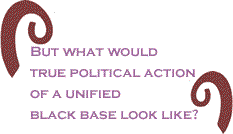 Ture
never saw Black Power merely as the corollary to White Power,
nor did he see it as something with the potential to become
as oppressive as the latter. The core of Black Power is the
creation of a racial solidarity between people of African
descent the world over. Ture and Hamilton conceptualized that
for any group to have power, it must first have true unity
since this was the foundation of true political action. But
what would true political action of a unified black base look
like? From a historical perspective, it could possibly resemble
the Lowndes County Freedom Organization, assembled by Ture
through the Student Nonviolent Coordinating Committee. This
party was formed for the purpose of giving newly registered
black voters in Alabama an alternative to the traditional
democratic dichotomy. Today, this blueprint for political
Black Power may take the form of concerted activism to designate
and elect candidates at the city, state, congressional, and
senatorial levels of this country. This raises another important
aspect of Black Power and the candidates it would endorse.
These representatives would be men and women who did not just
look like the people; they would think like the people, have
the same values of the people, and have arrived at the same
conclusions for addressing the challenges of the people. Ture
never saw Black Power merely as the corollary to White Power,
nor did he see it as something with the potential to become
as oppressive as the latter. The core of Black Power is the
creation of a racial solidarity between people of African
descent the world over. Ture and Hamilton conceptualized that
for any group to have power, it must first have true unity
since this was the foundation of true political action. But
what would true political action of a unified black base look
like? From a historical perspective, it could possibly resemble
the Lowndes County Freedom Organization, assembled by Ture
through the Student Nonviolent Coordinating Committee. This
party was formed for the purpose of giving newly registered
black voters in Alabama an alternative to the traditional
democratic dichotomy. Today, this blueprint for political
Black Power may take the form of concerted activism to designate
and elect candidates at the city, state, congressional, and
senatorial levels of this country. This raises another important
aspect of Black Power and the candidates it would endorse.
These representatives would be men and women who did not just
look like the people; they would think like the people, have
the same values of the people, and have arrived at the same
conclusions for addressing the challenges of the people.In this way, Obama is most unlike the politicians imagined by Ture, Hamilton, and many others. For, while Obama is most certainly one of “us”, his campaign’s emphasis on not making race an issue and stridently stating that there is no black America or white America but one America, is as insulting to brothers and sisters in Jena, Louisiana, Cincinnati, Ohio, Southeast Washington, DC and the Southside of Chicago, as it is blindly hopeful for the majority population. From the beginning of his campaign, the “blackness” of Obama has been questioned by everyone from barbershop debaters to political pundits. Most often, this specious argument is based in an assessment of how much Obama’s experience and upbringing mirrors that of the typical (whatever that really means) African-American experience. While there are blacks and whites who believe blackness is defined by the poverty you were born into, hood you came from, collard greens you eat or saxophone rifts you play, for many of us, blackness is considered in a much deeper and more visceral sense. We are a communal people, we are the people who have always considered the group over the individual, and we hold our leaders to such a standard. Maybe this is why there are some very politically astute blacks who question the commitment of Obama to our people?
Perhaps it is unfair
to hold Obama to the standard set by giants like Ture,
King, and Malcolm X. He is, after all, a politician; and
politics is nothing if not “majority rule”. |
Any BlackCommentator.com article may be re-printed so long as it is re-printed in its entirety and full credit given to the author and www.BlackCommentator.com. If the re-print is on the Internet we additionally request a link back to the original piece on our Website. Your comments are always welcome. eMail
re-print notice
If you send us an eMail message we may publish all or part of it, unless you tell us it is not for publication. You may also request that we withhold your name. Thank you very much for your readership. |
|
| July
3, 2008 Issue 284 |
|
| Executive Editor: Bill Fletcher, Jr. |
| Managing
Editor: |
| Publisher: Peter Gamble |
| Est. April 5, 2002 |
| Printer Friendly Version in resizeable plain text format or pdf format. |
 |
 |
 |
| |
| |





















